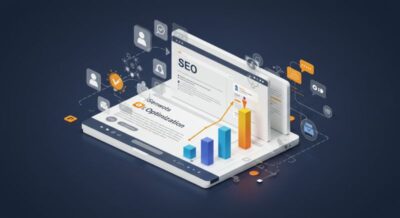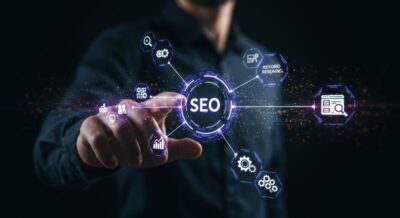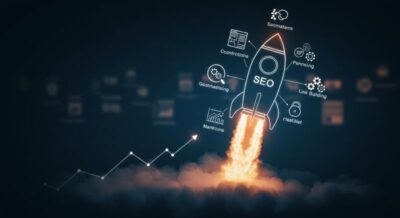Revolutionizing Digital Marketing: How AI Is Reshaping Customer Engagement and ROI
Artificial Intelligence (AI) is no longer a futuristic concept; it is a powerful and indispensable force in digital marketing today. From chatbots and personalized recommendations to real-time analytics and predictive modeling, AI is radically transforming how brands connect with customers and optimize their ROI.
This article explores how AI is reshaping digital marketing, highlighting its tools, benefits, case studies, and future trends. If you’re a marketer, brand strategist, or entrepreneur, understanding AI’s impact is no longer optional—it’s essential.
Table of Contents
- Introduction: The AI Surge in Digital Marketing
- 1. Understanding AI’s Role in Modern Marketing
- 2. AI-Powered Customer Segmentation
- 3. Hyper-Personalization at Scale
- 4. Chatbots and Conversational AI
- 5. Predictive Analytics: Forecasting Buyer Behavior
- 6. AI-Driven Content Creation and Optimization
- 7. Programmatic Advertising and Media Buying
- 8. Visual and Voice Search Integration
- 9. Real-World Case Studies
- 10. The Future of AI in Digital Marketing
- FAQ
Introduction: The AI Surge in Digital Marketing
Artificial Intelligence is fundamentally redefining the boundaries of what’s possible in digital marketing. No longer limited to automated email campaigns, AI now influences nearly every aspect of the marketing funnel.
The convergence of big data, machine learning, and real-time analytics has enabled marketers to deliver smarter, faster, and more targeted campaigns.
1. Understanding AI’s Role in Modern Marketing
AI in digital marketing refers to the use of technologies like machine learning, natural language processing (NLP), predictive analytics, and automation tools to enhance marketing strategies. These systems process enormous volumes of data to:
- Automate tasks like ad buying
- Personalize content at an individual level
- Predict user behavior
- Optimize campaigns in real-time
Key AI technologies include:
- Machine Learning (ML)
- Natural Language Processing
- Computer Vision
- Deep Learning
- Generative AI
2. AI-Powered Customer Segmentation
One of AI’s most transformative contributions is its ability to segment audiences with precision and speed. Traditional segmentation methods often rely on basic demographics. AI enables:
- Behavioral segmentation based on user actions
- Psychographic profiling from social data
- Predictive segmentation for future actions
These insights allow marketers to:
- Send the right message at the right time
- Reduce customer acquisition costs
- Improve lifetime value (LTV) of users
✅ Example Tool: HubSpot’s AI-driven CRM
3. Hyper-Personalization at Scale
Consumers expect relevant experiences—and AI delivers. Using real-time data, AI algorithms can personalize:
- Website content
- Product recommendations
- Email marketing
- Push notifications
🔍 Hyper-personalization has led to:
- Increased engagement
- Higher conversion rates
- Improved customer satisfaction
Top platforms using AI for personalization:
4. Chatbots and Conversational AI
AI chatbots have evolved into sophisticated tools capable of conducting human-like conversations, solving customer issues, and even closing sales.
Benefits of chatbots:
- 24/7 customer service
- Cost-effective support
- Reduced wait times
- Higher engagement
Popular AI chatbot platforms:
5. Predictive Analytics: Forecasting Buyer Behavior
AI excels in identifying patterns in consumer behavior. Through predictive analytics, marketers can forecast:
- Purchase intent
- Churn likelihood
- Best-performing channels
- Ideal timing for outreach
📈 Predictive models help brands:
- Maximize ROI
- Allocate budgets efficiently
- Personalize user journeys proactively
Tool highlight: Salesforce Einstein
6. AI-Driven Content Creation and Optimization
AI tools can now write, edit, and optimize content based on SEO best practices. Platforms like ChatGPT and Jasper AI help marketers:
- Generate blog posts and ad copy
- Optimize for keywords
- A/B test variations
- Improve readability and relevance
💡 SEO-focused content AI tools:
7. Programmatic Advertising and Media Buying
AI has revolutionized media buying through programmatic advertising. It automates the process of purchasing ad space and optimizes ad delivery in real time.
Advantages include:
- Better targeting
- Lower cost per acquisition (CPA)
- Higher return on ad spend (ROAS)
- Real-time bidding (RTB)
📊 Key platforms:
8. Visual and Voice Search Integration
Voice and visual search are rapidly gaining traction. AI technologies are enabling brands to optimize for search behavior beyond text.
Visual Search:
- Uses image recognition
- Enhances product discovery
- Tools: Google Lens, Pinterest Lens
Voice Search:
- Driven by NLP and speech recognition
- Requires optimized, conversational content
- Smart assistants: Siri, Alexa, Google Assistant
9. Real-World Case Studies
1. Starbucks’ DeepBrew AI Engine
- Analyzes purchase history
- Personalizes offers and emails
- Drives app engagement and loyalty
2. Sephora’s Virtual Artist
- Uses AI and AR to offer virtual makeup trials
- Enhances user experience and product sales
3. Nike’s AI-Powered Nike Fit
- Uses computer vision to recommend perfect shoe size
- Reduces product returns
10. The Future of AI in Digital Marketing
What’s next? Expect even deeper AI integration across the customer lifecycle. Key trends include:
- AI-generated videos and virtual influencers
- AI-powered dynamic pricing models
- Multimodal AI content
- Zero-click search optimization
- Privacy-aware AI marketing tools
Businesses that adopt these innovations will lead the race for consumer attention and digital dominance.
FAQ
1. How is AI used in digital marketing?
AI is used to automate tasks, analyze large data sets, personalize content, predict customer behavior, and enhance ROI across multiple marketing channels.
2. Which tools use AI for digital marketing?
Popular tools include HubSpot, ChatGPT, Jasper AI, Google Ads, and Surfer SEO.
3. Can AI replace digital marketers?
AI augments digital marketers by handling repetitive tasks and providing insights, but human creativity, strategy, and empathy are still irreplaceable.
4. Is AI content good for SEO?
Yes, when optimized correctly. Tools like MarketMuse and Clearscope ensure AI content aligns with SEO best practices.
5. What industries benefit most from AI marketing?
E-commerce, finance, healthcare, SaaS, and retail benefit heavily due to high data volumes and customer interaction needs.
Conclusion
AI is not just a buzzword—it’s the backbone of next-generation digital marketing. Brands leveraging AI technologies are already witnessing unprecedented levels of personalization, efficiency, and ROI.
From predictive analytics to automated content creation, the potential is vast and growing. Businesses that integrate AI into their digital strategy today will be the ones dominating the market tomorrow.
Are you ready to transform your digital strategy with AI?
Would you like a downloadable PDF version or social media snippets for this article?

A digital marketer with over 10 years of experience, sharing insights on the Digital Marketing Blueprint Blog. Helping you master SEO, Social Media, and Online Promotion.





